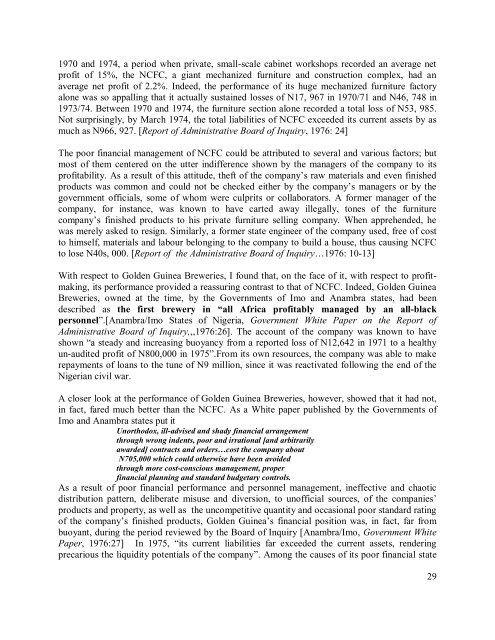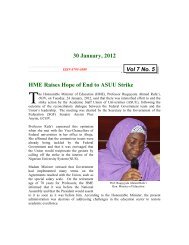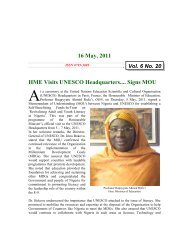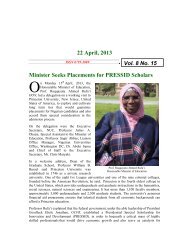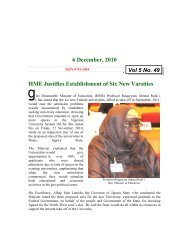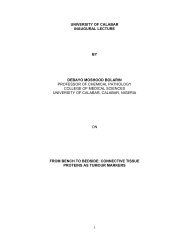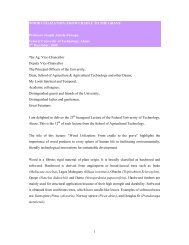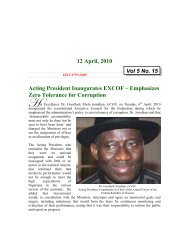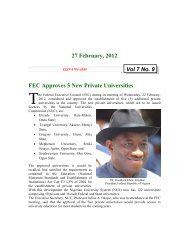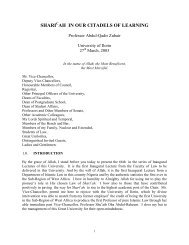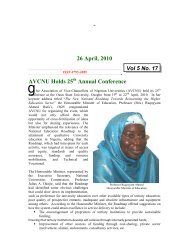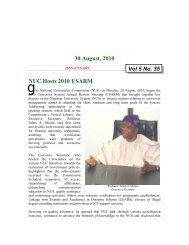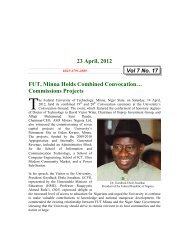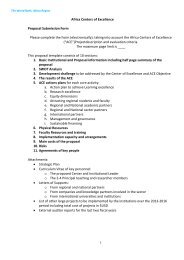From State And State Power To Man And Social - National ...
From State And State Power To Man And Social - National ...
From State And State Power To Man And Social - National ...
You also want an ePaper? Increase the reach of your titles
YUMPU automatically turns print PDFs into web optimized ePapers that Google loves.
1970 and 1974, a period when private, small-scale cabinet workshops recorded an average netprofit of 15%, the NCFC, a giant mechanized furniture and construction complex, had anaverage net profit of 2.2%. Indeed, the performance of its huge mechanized furniture factoryalone was so appalling that it actually sustained losses of N17, 967 in 1970/71 and N46, 748 in1973/74. Between 1970 and 1974, the furniture section alone recorded a total loss of N53, 985.Not surprisingly, by March 1974, the total liabilities of NCFC exceeded its current assets by asmuch as N966, 927. [Report of Administrative Board of Inquiry, 1976: 24]The poor financial management of NCFC could be attributed to several and various factors; butmost of them centered on the utter indifference shown by the managers of the company to itsprofitability. As a result of this attitude, theft of the company’s raw materials and even finishedproducts was common and could not be checked either by the company’s managers or by thegovernment officials, some of whom were culprits or collaborators. A former manager of thecompany, for instance, was known to have carted away illegally, tones of the furniturecompany’s finished products to his private furniture selling company. When apprehended, hewas merely asked to resign. Similarly, a former state engineer of the company used, free of costto himself, materials and labour belonging to the company to build a house, thus causing NCFCto lose N40s, 000. [Report of the Administrative Board of Inquiry…1976: 10-13]With respect to Golden Guinea Breweries, I found that, on the face of it, with respect to profitmaking,its performance provided a reassuring contrast to that of NCFC. Indeed, Golden GuineaBreweries, owned at the time, by the Governments of Imo and Anambra states, had beendescribed as the first brewery in “all Africa profitably managed by an all-blackpersonnel”.[Anambra/Imo <strong>State</strong>s of Nigeria, Government White Paper on the Report ofAdministrative Board of Inquiry,,,1976:26]. The account of the company was known to haveshown “a steady and increasing buoyancy from a reported loss of N12,642 in 1971 to a healthyun-audited profit of N800,000 in 1975”.<strong>From</strong> its own resources, the company was able to makerepayments of loans to the tune of N9 million, since it was reactivated following the end of theNigerian civil war.A closer look at the performance of Golden Guinea Breweries, however, showed that it had not,in fact, fared much better than the NCFC. As a White paper published by the Governments ofImo and Anambra states put itUnorthodox, ill-advised and shady financial arrangementthrough wrong indents, poor and irrational [and arbitrarilyawarded] contracts and orders…cost the company aboutN705,000 which could otherwise have been avoidedthrough more cost-conscious management, properfinancial planning and standard budgetary controls.As a result of poor financial performance and personnel management, ineffective and chaoticdistribution pattern, deliberate misuse and diversion, to unofficial sources, of the companies’products and property, as well as the uncompetitive quantity and occasional poor standard ratingof the company’s finished products, Golden Guinea’s financial position was, in fact, far frombuoyant, during the period reviewed by the Board of Inquiry [Anambra/Imo, Government WhitePaper, 1976:27] In 1975, “its current liabilities far exceeded the current assets, renderingprecarious the liquidity potentials of the company”. Among the causes of its poor financial state29


